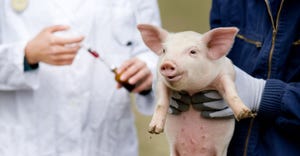Global Conference Addresses Animal Drug Resistance Issues
March 19, 2013

National, regional and global experts and stakeholders in the field of pharmacology, epidemiology, animal health and human health, gathered in Paris recently for the three-day Office of International Epizootics (OIE) Global Conference on the Responsible and Prudent Use of Antimicrobial Agents for Animals to discuss the current situation on antimicrobial use worldwide and antimicrobial resistance. The Conference was organized in close collaboration with the World Health Organization (WHO) and the Food and Agriculture Organization of the United Nations (FAO).
“The OIE has already adopted numerous standards on the responsible and prudent use of antimicrobials in animals and strongly encourages the governments of all its member countries to include these prudential standards in their veterinary legislation. Only a rational, worldwide approach involving all those working in animal health can have any chance of succeeding.
“Furthermore, the support of international partner organizations and the international community is crucial to achieve this objective, since localized action solely in some rich countries would be of little use in a globalized world where resistant bacteria can circulate everywhere,” stated Bernard Vallat, the director-general of the OIE.
Keiji Fukuda, assistant director-general – Health Security and Environment, World Health Organization (WHO), also emphasized that “antimicrobial agents should only be prescribed by authorized professionals such as medical doctors and veterinarians. Under the ‘One Health’ concept, this approach is crucial to maintain the efficacy of antimicrobial agents in human and veterinary medicine.”
A consensus was reached on the need to stimulate cooperation and international solidarity with regard to ensuring supervision of the production, importation, marketing, distribution and use of antimicrobials.
Given that resistant bacteria know no borders and inadequate management by a single country can jeopardize all the others, the participants advocated strengthening cooperation to help countries that are not yet in a position to apply the OIE's prudential standards to put in place the necessary legislation, structures and human and financial resources.
They also recommended strengthening good governance practices regulating the production, importation, registration, marketing, distribution and use of quality veterinary medicinal products worldwide.
Vallat concluded by saying that “the content of veterinary education and the effectiveness of Veterinary Statutory Bodies, the ethics and supervision of the veterinary profession and the capacity of the competent control authorities are crucial elements of the functional and legal framework within which the veterinary profession must operate. Together, they constitute a key component in the concept of good governance advocated by the OIE. The prescription and delivery of antimicrobials in animal production farms must in all countries be performed by well-trained veterinarians who are supervised in compliance with legal requirements to ensure that professional integrity and ethics are constantly maintained”.
The Conference brought together the representatives of more than 100 countries and the various sectors involved; officials of national and international authorities and representatives of national, regional and international groups and the private sector took part in the event.
You might also like:
White Paper Addresses Antimicrobial Use, Resistance Issues
Logic vs. Fear: Antibiotic Use Draws Passionate Response
FDA Issues Report on Antimicrobial Use in Food-Producing Animals
You May Also Like



